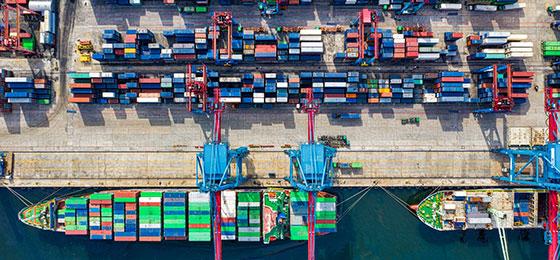Trade agreements only partly shift environmental burden onto poorer countries

Is trade liberalisation shifting environmental burden from industrialised countries to poorer ones? This question was investigated by a research team at ETH Zurich led by Thomas Bernauer. In particular, they analysed whether, and if so how, commerce driven by free trade agreements is transferring environmental impacts from industrialised countries to poorer ones.
As economic globalisation – and free trade in particular – progress, the associated environmental burden may tend to be transferred abroad. Researchers working on the National Research Programme "Sustainable Economy: resource-friendly, future-oriented, innovative" (NRP 73) are investigating the environmental impacts of production and consumption. They are also elucidating the influence of trade policy and political institutions on these environmental impacts.
Partial proof of trade-related environmental impact
The researchers investigated the effect of global trade on environmental impact in 183 countries between 1987 and 2013 using the World Bank's "Country and Lending Groups" classification. The results confirm that free trade or preferential trade agreements lead to environmental impacts being partially shifted to poorer countries, for example as a result of raw materials extraction or forest clearance. However, the agreements do not automatically mean that industrialised nations import and consume larger quantities of these impacts in the form of products. Even today, the transfer of technological innovations and creation of environmental standards are counteracting the shift in environmental impacts.
Environmental clauses have no effect
The results of the study also show that environmental clauses in free trade agreements and international environmental conventions have no effect on the relationship between trade liberalisation and the shift of environmental burden.
Dennis Kolcava, a PhD student at ETH Zurich and lead author of the published article attributes this to various factors, among them the mutually non-binding nature of environmental clauses in free trade agreements owing to their lack of diplomatic weight. Furthermore, very few international environmental agreements contain watertight enforcement mechanisms.
Welfare-enhancing and environmentally friendly trade agreements
To mitigate the shift in consumption- and production-related environmental burden, efforts are increasingly being made in the context of bilateral or regional trade agreements to incorporate trade and environmental policy more effectively. However, the results indicate that free trade agreements in themselves almost never lead to wealthier countries exploiting the natural capital of poorer ones. They do show, though, that different political systems have a substantial influence on the trade-related shift in environmental impacts. The researchers found evidence to show that democratic states provide political incentives to relocate environmental impacts to other countries. Decision-makers must therefore ensure that the free trade agreements they set up are welfare-enhancing, environmentally friendly, and enforced. However, the examples of the Transatlantic Trade and Investment Partnership and the Comprehensive Economic and Trade Agreement between the EU and Canada show that this is anything but straightforward.
Contact
Prof. Thomas Bernauer
Institute of Science, Technology and Policy (ISTP)
ETH Zurich
Haldeneggsteig 4
IFW C
Zürich
Phone: +
71
E-Mail:
National Research Programme "Sustainable Economy: resource-friendly, future-oriented, innovative" (NRP 73)
NRP 73 aims to generate scientific knowledge about a sustainable economy that uses natural resources sparingly, creates welfare and increases the competitiveness of the Swiss economy. The NRP takes account of the environment, the economy and society, as well as all natural resources and stages of the value chain. The research work encompasses 29 projects being carried out between 2017 and 2023. The budget amounts to 20 million Swiss francs.